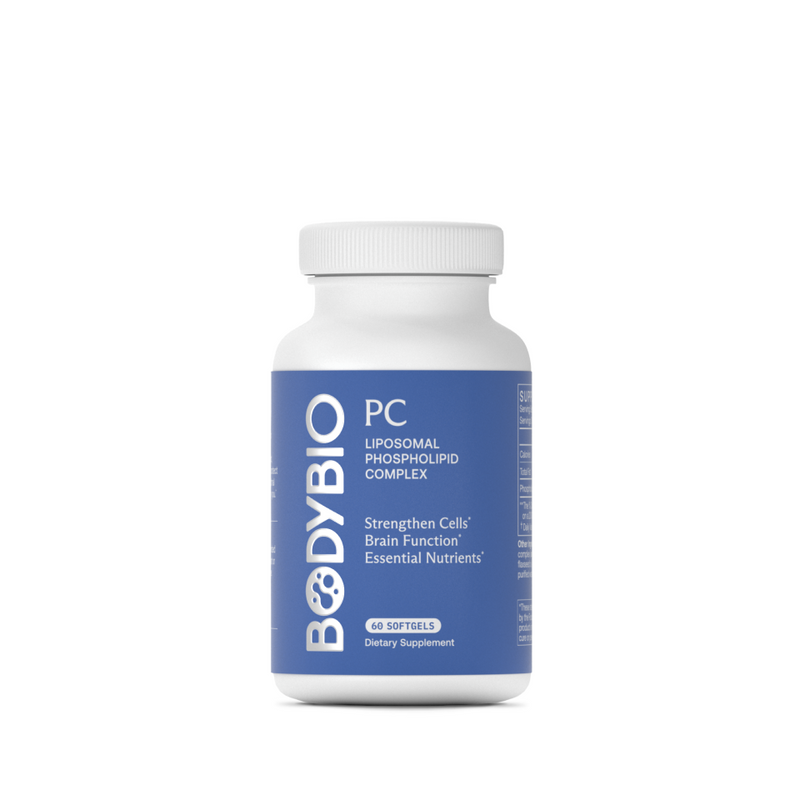12 Essential Pregnancy Supplements for Healthy Moms and Babies
My grandparents started BodyBio over 30 years ago. Health and supplements have always been a part of my life. I struggled with IBS, PCOS, hypothyroidism and more, and it was not until I really dialed in my supplements that I began to feel better.
In my early 30’s, as I started thinking about having children, I was told that I have PCOS, I would be diabetic in a few years, and I would need Metformin and Clomid to get pregnant. Now, there is absolutely nothing wrong with taking those drugs, but I knew I needed to take my health more seriously. I really looked at my diet and how supplements could help me with my health goals. Fast forward a few years, I am 37, pregnant with my third baby and fortunate to say I did not need any drugs to help me get pregnant, nor am I diabetic.
Our health journeys are all so personalized and, being a part of BodyBio, I have access to incredible doctors and researchers to guide me along the way. Here are my pregnancy recommendations and how I take care of myself and my babies while pregnant and nursing.
PC
I think I would be a brain fog mess if it weren't for BodyBio PC. I also attribute my healthy pregnancies and healthy babies to this supplement. Phospholipids are so important to healthy fetal development, and unfortunately, we do not get enough from our food.
We all read about how important choline is for pregnancy, and BodyBio PC is basically a superior form of choline, supplying the building blocks for healthy cells –– definitely important for growing babies! Keep in mind most Prenatal's do not have choline in them so it is important to supplement!
Balance Oil
We do not make essential fatty acids so we must consume them in foods. Sadly with all our processed foods using toxic vegetable oils, our levels of Omega 6 to Omega 3 are completely out of whack. Balance Oil is the exact ratio of LA and ALA that we need –– and that babies need for healthy fetal development. I take it every day; it's non-negotiable.
Nutrition tip: Add Balance Oil to smoothies to make them more rich, or drizzle it on top of foods. Never heat it, to preserve the benefits of the oil. It will also help to make breastmilk super fatty and nutritious. If you look at the main ingredients in most baby formula, you will see LA and ALA, but sadly these are dried and tend to be low quality sources. But you can always add our Balance Oil into formula to give the baby added EFAs!
E-Lyte
E-Lyte is my secret weapon in the war against charley horses. I drink it first thing in the morning, throughout the day, and in the glass of water I keep on my nightstand. Whenever I feel that muscle cramping in my feet or legs, I chug some E-Lyte and the cramps are gone! Be careful not to exceed one ounce a day unless exercising.
I also drink it throughout my labors –– after-all, labor is one giant muscle cramping –– and afterwards the added minerals help with breast milk production. Mammas write to me all the time to tell me how much they notice an increase in production when using E-Lyte.
Prenatal Vitamin
For my third pregnancy I am taking a prenatal for the first time. Typically, rather than synthetic vitamins, I choose to get the vitamins I need with a nutrient-dense diet, one that includes foods for vitamins A and D. One of my favorite diets to follow during pregnancy is the Weston Price Foundation diet, which is also great for postpartum and breastfeeding support, although I do not recommend cod liver oil.
Amino Acids and Glycine
Protein intake is so important during pregnancy. But in my first trimester, and even into my second, I find it very hard to get adequate levels of protein. I supplement with Allergy Research Groups Free Aminos as well as collagen powder and protein powder to get me through.
Looking at glycine specifically, when we are not pregnant we are usually able to make enough ourselves but during pregnancy we need extra. Low glycine has been linked as a limiting factor for fetal growth. [x]
Glycine is transported to the growing fetus from two sources: directly from the mother’s blood, or from another amino acid called serine when folate is used to transform it. Good sources of glycine are collagen-rich foods like bone broths and gelatin.
Glycine can be used up when detoxifying excess methionine, another amino acid. Key sources of methionine include eggs and meat, which are higher in bioavailable protein than from plant foods.
Nutrition tip: Every week I make a bunch of soft boiled eggs and try to eat at least 2 a day. You can use a high quality collagen powder, which is rich in amino acids, or eat more muscle meats including folate-rich liver, legumes and greens.
B Vitamins + 5MTHF
I started taking a methylated vitamin B complex about six months before I got pregnant. My midwife suggested this to build up my folate stores. I continue taking it as a pregnancy supplement here and there throughout pregnancy –– especially when I need some energy.
I also occasionally add in NADH/B3 as it has been found that increased B3 in the first trimester can decrease miscarriage rates. More studies are needed on dosage but when I need energy, I find it really helps. Be cautious of supplementing individual B's consistently for too long, you want to take a full complex to make sure not to offset your other B levels. If you have the MTHFR mutations, you will want to take a methylated B vitamin as found in BodyBio B Vitamin+. I also take 5MTHF if I am not taking our B Complex that day.
Learn more about folate, folic acid and folinic acid in this post.
Nutrition tip: Take a tablespoon of bee pollen and/or add 2 TB of nutritional yeast flakes to some food or juice daily. Nutritional yeast is also a great source for nutrients required during breastfeeding.
Liquid Trace Minerals
I add our Liquid Trace Minerals to smoothies, coffee, juice, or any beverage to make sure I am getting a good level of minerals (essential for muscle contraction, cellular communication and transport, hormone balance, and about a million other things). This is an easy one to give to your kids as well!
Magnesium
So many of us are deficient in magnesium. Some say that Mg helps with morning sickness, although I found that nothing helped with my constant all-day nausea in the first trimester! When women get pregnant, the flood of hormones can slow down our digestion and bowels. I recommend magnesium citrate for constipation. Not all magnesiums are the same, but I find this type really helps.
The rule of thumb for dosage is to take magnesium until your stools get loose. Then dial back slightly. Only use this sporadically. Long-term use can lower ceruloplasmin levels, which helps to regulate important minerals like iron and copper in your body, so keep it to short term use if you’re struggling with constipation or restless leg syndrome during pregnancy.
Vitamin C
Most prenatals are very low in vitamin C. Not only is it great for immunity, but vitamin C is also excellent while pregnant because it’s nourishing for your baby’s placenta. It also helps to regulate copper and iron levels in the body.
Probiotics
I prefer to get probiotics from food sources, eating fermented foods like yogurt, kefir, kimchi, sauerkraut, etc. I make my own kefir with kefir grains sometimes and find it helps with digestion/constipation. I do not eat these foods daily, just when I find I need some.
Digestive Enzymes
I think everyone can benefit from taking one. I like Thorne's Biogest or a basic HCl supplement. Just one at each meal helps prevent indigestion.
Fish Oil
In the third trimester I add in a daily fish oil for added DHA development for the baby. Be very careful where you source these from –– most fish oils are rancid and can be very detrimental to your health because they use heat to extract the oil.
Our BodyBio Fish Oil is not only sourced from small-bodied fish like anchovies and sardines but it is extracted using a fascinating supercritical carbon dioxide technology that preserves the delicate essential fatty acids so you can trust the purity and quality.
Moderation is the key
Moderation is my life motto. If I am craving a bagel –– guess what? –– I have a bagel. During this pregnancy, the first trimester was rough for me, so I got whatever nutrients I could in and never skipped my bioactive lipids and oils like PC and Balance Oil, no matter how much I gagged.
But overall, supplement in moderation. Try to balance your diet with nourishing foods you know will help your baby develop and continue to help you feel good throughout your pregnancy. Cut back on the things that are not nourishing you well, all the junk food, white flour, sweeteners, food dyes, etc. Post-pregnancy, your body will thank you.





